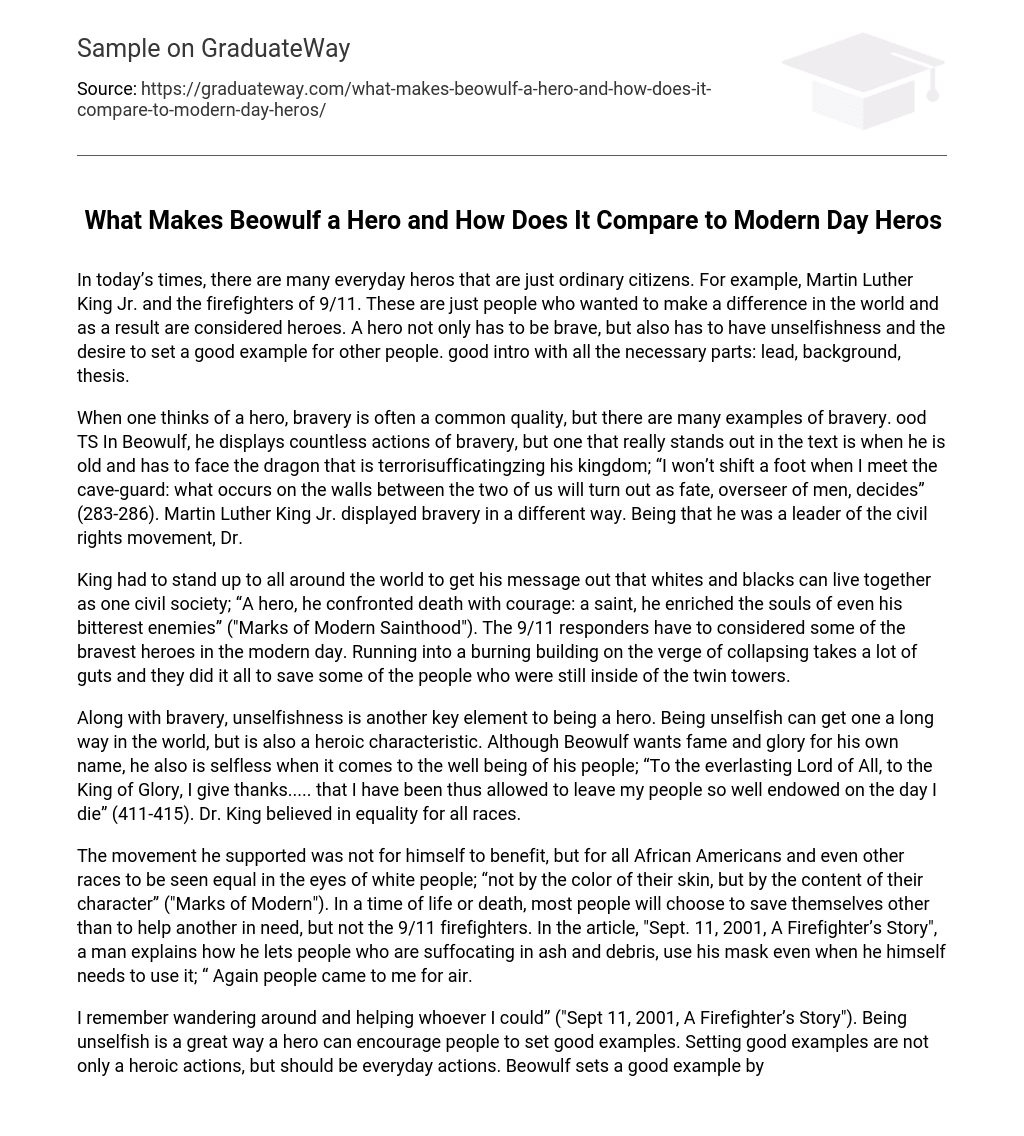Everyday heroes can be found in modern society, including famous figures like Martin Luther King Jr. and the brave firefighters who responded heroically during 9/11. These individuals are motivated by a strong desire to bring positive changes to the world, making them heroes.
It is essential to recognize that heroism goes beyond just bravery; it also involves selflessness and a deep aspiration to serve as role models for others. Therefore, this essay aims to examine everyday heroes and their impact on society, emphasizing their influence and significance.
When it comes to heroes, bravery is often mentioned as a common quality. There are various examples of bravery. Beowulf shows numerous acts of bravery. However, one significant instance in the text involves him confronting a dragon that terrorizes his kingdom during his old age: “I won’t shift a foot when I meet the cave-guard: what occurs on the walls between the two of us will turn out as fate, overseer of men, decides” (283-286). On the other hand, Martin Luther King Jr. exhibits bravery in a different way. As a leader of the civil rights movement, Dr. King demonstrates courage in his endeavors.
King bravely fought against widespread opposition to promote racial harmony, proclaiming that whites and blacks could coexist harmoniously as part of a single civil society. His tremendous courage in the face of death and his ability to inspire even his most vehement adversaries earned him the title of a hero and a saint (“Marks of Modern Sainthood”). Similarly, the 9/11 responders are widely regarded as contemporary heroes due to their immense bravery. They fearlessly entered a burning building on the brink of collapse with the sole purpose of rescuing those still trapped within the twin towers.
Being unselfish is an important trait for heroes and can result in great success. It is also a heroic characteristic. Despite his personal desire for fame and glory, Beowulf demonstrates selflessness towards his people’s well-being. He expresses gratitude to the everlasting Lord of All and the King of Glory, acknowledging the chance to ensure his people are taken care of after he passes away (411-415). Similarly, Dr. King passionately advocated for racial equality.
The purpose of the movement he supported was to ensure equality among African Americans and individuals from other races in the eyes of white people, where character rather than skin color would be the basis (“Marks of Modern”). Despite prioritizing their own survival over helping others in need during critical moments, this did not happen with the firefighters who responded to the 9/11 tragedy. In “Sept. 11, 2001, A Firefighter’s Story,” one individual selflessly allowed suffocating individuals covered in ash and debris to use his mask despite needing it himself: “Again people came to me for air.”
“I remember wandering around and helping whoever I could” (“Sept 11, 2001, A Firefighter’s Story”). This act of selflessness is a powerful way for heroes to inspire others. It demonstrates that setting positive examples should be integrated into our everyday lives. In the epic poem Beowulf, the titular character sets a remarkable precedent by returning the favor to King Hrothgar for his father’s assistance in times of crisis; “Beowulf, you’ve come to us in friendship, and because of the reputation your father found at our court” (191-192).
Despite the passage of time, Martin Luther King Jr. remains an enduring source of inspiration for both current and future generations, as his teachings and influence continue to resonate even with those who have yet to be born. As highlighted in “Marks of Modern Sainthood,” individuals who were not present or too young during his era still acknowledge the profound impact he had on society. The dream that King envisioned, namely achieving racial equality between black and white individuals, has indeed been realized. Similarly, the firefighters who bravely responded to the tragic events of 9/11 displayed exceptionally admirable behavior by demonstrating immense bravery in their selfless attempts to save as many lives as possible.
While it is not suggested that individuals should risk their own lives to aid others, it remains crucial to contemplate assisting someone in times of crisis. Whether engaged in combatting mythical creatures, advocating for equal rights, or rescuing people from fires, ordinary individuals have chances to become heroes. Acts of bravery, selflessness, and serving as positive role models are simple actions that can be undertaken within the confines of one’s home. Even lacking superhuman abilities does not prevent one from being perceived as a hero by their family and those in their vicinity.





